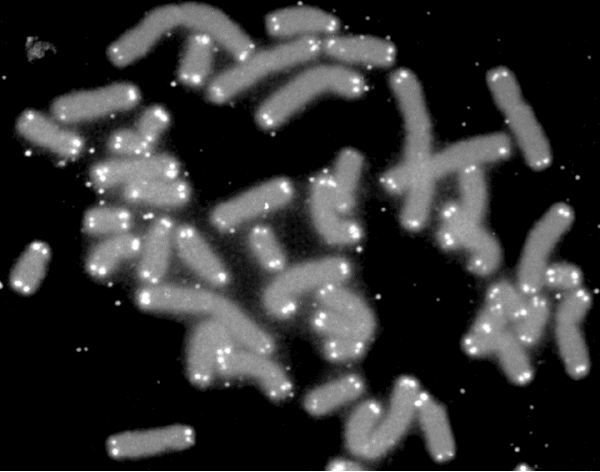Telomeres and the Biology of Ageing: Could An Understanding of the Effect of Telomere Shortening on the Life of a Cell Increase Longevity?
What are Telomeres?
Human genes exist as fragments on the long double stranded molecules of DNA (deoxyribonucleic acid) which are packaged into the chromosome structure. There are 46 chromosomes in most of our cells. Telomeres are the repetitive sequences of six nucleotides (TTAGGG), which are located specifically at the end of every linear chromosome, and they have a crucial function. Telomeres protect the ends of chromosomes from damage, and they stop them from sticking together during cell division.
The consequences of chromosomes sticking together are disastrous. It can bring about changes in the genetic sequence, cause cancer and even death.
Further, the presence of telomeres allows the cell to distinguish chromosome ends from broken DNA. If there were no telomeres at the end of each chromosome the cell would register this as broken DNA and would either die or initiate a series of self-repair mechanisms.
Telomeres and Ageing
The importance of the discovery of telomeres lies in their relevance to the biology of ageing and the development of cancer cells.
During cell division, telomeres get shorter and shorter. This is due to the inability of the enzyme DNA polymerase to replicate some of the chromosomal ends. Each cell has a limited lifespan and undergoes a finite number of cell divisions before it exposes its genetic information and dies. This is known as cellular senescence. Telomere length therefore is a good indicator of cell longevity.
A Key to Immortality?

Inside each cell there are genes for an enzyme known as telomerase. This is an enzyme that in stem cells can maintain telomere length and help the cell to divide indefinitely. However, in our differentiated cells, for most of the time, these genes for telomerase are switched off. But if there was some way of switching them on, perhaps they could maintain telomere length, and hence extend cellular lifespan and perhaps our own? Could the key to immortality already be with us? Are they the genes that control the production of these enzymes? Another key question is whether telomere shortening is a cause of ageing or merely a sign of it, in the way that wrinkles and liver spots are signs of advanced years. If shortening is a sign then maintaining telomere length won’t alter cell longevity.
These questions have certainly got scientists scratching their heads and thinking, but there is at least one good reason (at the moment) why activating telomerase genes might not be such a good idea. The enzyme has been found to be active in cancerous cells. It keeps tumour cells proliferating, for without it the mutated cells would eventually die as their telomeres progressively shorten. It therefore appears that if we were able to activate telomerase to extend cellular life, and possibly our life spans, this might actually have the opposite effect. Telomerase activation could increase our cancer risk by stopping mutated cells from dying.
However, there are several research efforts looking to control the activity of telomerase in cancer cells. If scientists can manage telomerase activities it might stop cancer cells from utilizing the enzyme. This in itself would be a boon to the biology of ageing, because it may provide us with new weapons against cancer, and whilst not guaranteeing immortality, it would help extend the lives of cancer sufferers.
Sources
Hallmarks of telomeres in ageing research - JW Shay* and WE Wright; Journal of Pathology
J Pathol 2007; 211: 114–123
University of Texas Southwestern Medical Center, Department of Cell Biology, Dallas, TX 75390-9039, USA
Telomeres, Aging, and Tumorigenesis by. Jerry W. Shay
Are Telomeres the Key to Aging and Cancer? by Lee J. Siegel (University of Utah)